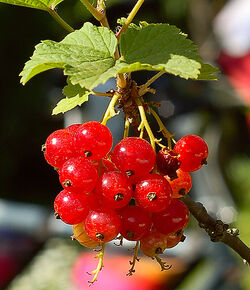mNo edit summary |
mNo edit summary |
||
| Line 18: | Line 18: | ||
* [[Currant Squares]] |
* [[Currant Squares]] |
||
* [[Duke of Devonshire Cake]] |
* [[Duke of Devonshire Cake]] |
||
| + | * [[Red Currant Delight]] |
||
* [[Russian-style Red Currant Jelly]] |
* [[Russian-style Red Currant Jelly]] |
||
Revision as of 19:50, 1 July 2010

Red currants
About Red currants
With maturity, the tart flavor of red currant fruit is slightly greater than its black currant relative, but with approximate sweetness. The albino variant of red currant, often referred to as white currant, has the same tart flavor but with greater sweetness. Although frequently cultivated for jams and cooked preparations, much like the white currant, it is often served raw or as a simple accompaniment in salads, garnishes, or drinks when in season.
In the United Kingdom, red currant jelly is a condiment traditionally served with lamb in a sunday roast. It is essentially a jam and is made in the same way, by adding the red currants to sugar and boiling.
In France, the highly rarefied and hand-made Bar-le-duc or Lorraine jelly is a spreadable preparation traditionally made from white currants or alternatively red currants.
In Scandinavia and Schleswig Holstein, it is often used in fruit soups and summer puddings (Rødgrød, Rote Grütze or Rode Grütt); in Germany it is also used in combination with custard or meringue as a filling for tarts; in Linz, Austria, it is the most commonly used filling for the Linzer torte. Unlike the cranberry, it certainly can be enjoyed in its fresh state and without the addition of sugar.
In German-speaking areas, syrup or nectar derived from the red currant is added to soda water and enjoyed as a refreshing drink named Johannisbeerenschorle. So named because the red currant (Johannisbeeren in German) are said to first ripen on Johannistag or June 24.
Red currant Recipes
- Carse of Gowrie Fruit Salad
- Currant Cakes
- Currant Squares
- Duke of Devonshire Cake
- Red Currant Delight
- Russian-style Red Currant Jelly